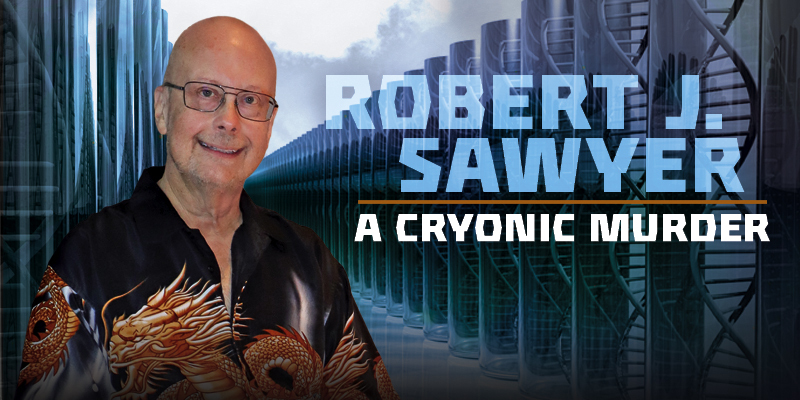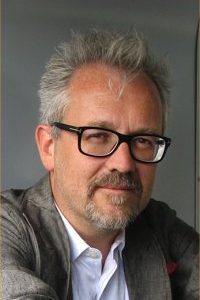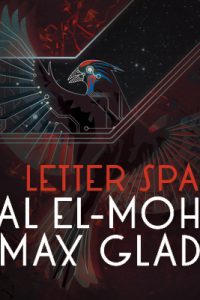Robert J. Sawyer: A Cryonic Murder
Robert James Sawyer was born April 29, 1960 in Ottawa, Canada. His family moved to Toronto when he was a baby, and he has lived there ever since. He earned a bachelor’s in radio and television arts (broadcasting) from Ryerson Polytechnic University, Toronto in 1982. After graduating, he briefly worked at SF specialty store Bakka-Phoenix Books before spending most of the ‘80s as a freelance non-fiction writer, doing journalism for Canadian newspapers and high-tech and business magazines.
Sawyer sold a few SF stories in the ‘80s, beginning with ‘‘If I’m Here, Imagine Where They Sent My Luggage’’ for The Village Voice (1981), gradually transitioning to a career as a full-time SF writer in the early ‘90s. Sawyer’s short fiction includes Aurora Award winners ‘‘Just Like Old Times’’ (1993), ‘‘Peking Man’’ (1996), ‘‘Stream of Consciousness’’ (1999), ‘‘Ineluctable’’ (2002), and ‘‘Biding Time’’ (2006); ‘‘You See but You Do Not Observe’’ (1995), winner of France’s Grand Prix de l’Imaginaire; Hugo finalists ‘‘The Hand You’re Dealt’’ (1997) and ‘‘Shed Skin’’ (2004); Hugo, Nebula Award, and Aurora finalist ‘‘Identity Theft’’ (2005); and Bram Stoker Award finalist ‘‘Fallen Angel’’ (2000). His short work has been collected in Iterations (2002), Aurora winner Relativity: Essays and Stories (2004), Aurora finalist Identity Theft and Other Stories (2008), and trio Earth, Time, and Space (all 2019).
First novel Golden Fleece (1990) won an Aurora Award. Other novels include the Quintaglio Ascension trilogy Far-Seer (1992), Fossil Hunter (1993), and Foreigner (1994); End of an Era (1994), which won Japan’s Seiun Award; Aurora and Nebula Award winner and Hugo finalist The Terminal Experiment (1995); Aurora winner and Hugo and Nebula Award nominee Starplex (1996); Seiun winner and Hugo finalist Frameshift (1997); Illegal Alien (1997); Hugo finalist Factoring Humanity (1998); Aurora winner Flashforward (1999), later made into television series FlashForward (2009-2010); and Hugo finalist Calculating God (2000). His Hugo-winning novel Hominids (2002) began his Neanderthal Parallax trilogy, continuing with Hugo and Aurora finalist Humans (2003) and Hybrids (2003); the series won an Aurora Award for Best of the Decade in 2017. John W. Campbell Memorial Award winner Mindscan (2006) and Hugo and Campbell finalist Rollback (2007) form his ‘‘transhumanist pair,’’ about uploading human consciousness and extending human lifespans, respectively. His WWW trilogy includes Aurora winner and Hugo and Campbell Award finalist Wake (2009), Watch (2010), and the forthcoming Wonder (2011). Triggers (2012) was serialized in Analog before appearing in book form. Red Planet Blues (2013) was an Aurora Award finalist, Quantum Night (2016) won the award, and The Oppenheimer Alternative (2020) was also a finalist. His latest novel, The Downloaded, was published as an audio original in 2023, and is forthcoming in print in May 2024.
Sawyer has also edited numerous anthologies, including volumes of Canadian SF/F/H and mystery fiction; edited a science fiction imprint, Robert J. Sawyer Books, for Red Deer Press; is a frequent speaker at conferences, conventions, and festivals; and often teaches at writing programs. He won the Aurora Award for Lifetime Achievement in 2013, the Skylark Award for contributions to SF in 2014, and the Robert A. Heinlein Award for SF inspiring Space Exploration in 2017,
He has been married to poet Carolyn Joan Clink since 1984. They live in Mississauga, Ontario.
Excerpt from the interview:
“Most of my science fiction is set in the near future or the present day. Keeping ahead of rapidly changing technology is difficult – but it’s also exciting. I’m of the Greg Benford school of science-fiction writing, ‘playing with the net up,’ as he calls it. In many ways, it’d be easier to write stories set in the year 3000, with faster-than-light travel and other things that shade far more into fantasy than science fiction, but, for a serious hard science-fiction writer, taking real science and extrapolating it plausibly into the near term is an invigorating juggling act – and I enjoy it precisely because it is a challenge.
“For me, it’s all about the challenge. I don’t have to write anymore if I don’t want to; science fiction has been very good to me, and my wife, Carolyn, wants me to retire and enjoy the fruits of the labors I’ve already performed. The only reason for me to write something now is if it presents a new challenge: It has to be both different from anything I’ve written before and hard to pull off. And, indeed, for my 25th novel, The Downloaded, coming out in May, I wrote it precisely, as JFK said about going to the moon, ‘not because it was easy, but because it was hard.’
“The Downloaded, like a lot of my science fiction, crosses over with mystery; I’ve learned a lot of techniques that are applicable to SF from my leisure reading of mystery fiction. The art is making sure that by the end of the book, the reader says, ‘Oh, I should have seen that coming. I knew all that; how come I didn’t put it together?’ It’s subtle; it’s never the expository lump. It’s never a prologue that says: ‘Well, on this train called the Orient Express, everyone actually knows each other, and they’ve all contrived to come together on this particular…’ You don’t say that up front! For me, as both a reader and a writer, science fiction and mystery, two genres that celebrate rational thought, have way more intersection than do science fiction and fantasy.
“The Downloaded is about people whose bodies are in cryogenic suspension but whose conscious minds stay active in personalized virtual realities – until they’re awoken unexpectedly. Early on, I have the first person to revive look at the other cryochambers and discover that one of them has been smashed open and the skull of the person within it has been staved in. I had no idea who had done it, or why, but that kind of mystery is propulsive for the reader. Of course, that meant I had to figure out a satisfying answer – and eventually I did!
“There’s a famous cartoon in which a dog writes a mystery novel, and a human says, come on, how could a dog possibly do that? The reply is, ‘Well, he starts with the end and then works backward.’ I’ve never been good at that. Writers talk about whether they are ‘pantsers’ or ‘plotters’ – whether they fly by the seat of their pants, or meticulously plot out everything in advance. I always tell my writing students that being a plotter is more efficient, but I myself usually end up being a pantser. Gene Wolfe, famously, would just start writing and produce glorious, complicated, involuted stuff without any idea of where he was going. In mystery fiction, I know it’s supposed to be death – ha! – to not know the solution to the crime when you start off. And yet I have repeatedly – whether it’s a literal crime or just something that uses the mystery-fiction template – started with what seems to me to be an intriguing mystery and hoped, on a wing and a prayer, that I would figure out the solution during the writing.
“You can pre-order the print edition of The Downloaded now, but it’s actually been out since October 2023 as an audiobook from Audible. They approached me to do something for them, and I’d sold them on a different idea, one that was AI-related. Then, suddenly, the AI-as-enemy theme was that season’s arc on The Orville, and that season’s arc on Star Trek: Picard, and this was also during the third season of Westworld. I went back to Audible and said, ‘There’s an overload of this kind of material; I don’t want to do the AI project anymore.’
“They replied, ‘No problem, but what’s your new pitch?’ Well, this was sixty days after the World Health Organization had declared COVID-19 a pandemic – and that was the genesis. I said the pitch is that we’re all basically uploading our consciousnesses. We’re all living virtual lives. We’re not going to the office anymore, we’re telecommuting from home; we’re not going out to restaurants, we’re ordering in with Uber Eats; we’re not seeing our friends face-to-face, we’re having video chats. And, at some point, that’s going to all suddenly end because the pandemic will end. (And it could have ended a lot sooner if people had been sensible!) What would that transition of being forced back into physical reality be like? I had no idea then what the answer was – but that’s the nice thing about dealing with people like those at Audible. They had faith that I’d figure it out and simply said, ‘Great pitch – go for it!’
“So, yes, The Downloaded is definitely the COVID pandemic in metaphor. As I often say, science fiction is never about the year it’s putatively set in; it’s about the year in which it was written. One of my all-time favorite films is the original Planet of the Apes, which is not about the year 3978 when Taylor arrives there; it’s about 1967, the year it was made (it came out in 1968). It’s about race relations and the fear of nuclear war, the two front-page stories of almost every edition of every newspaper around the world in 1967. So although in The Downloaded most of the action takes place 500 years in the future (an aberration for me!), it’s really about our transition into and out of the COVID pandemic, and yet I do it without having a plague of any sort (I don’t hit you on the head with the metaphor). I found it very satisfying to write.
Interview design by Stephen H. Segal.
Read the full interview in the December and January 2023 issue of Locus.
 While you are here, please take a moment to support Locus with a one-time or recurring donation. We rely on reader donations to keep the magazine and site going, and would like to keep the site paywall free, but WE NEED YOUR FINANCIAL SUPPORT to continue quality coverage of the science fiction and fantasy field.
While you are here, please take a moment to support Locus with a one-time or recurring donation. We rely on reader donations to keep the magazine and site going, and would like to keep the site paywall free, but WE NEED YOUR FINANCIAL SUPPORT to continue quality coverage of the science fiction and fantasy field.
©Locus Magazine. Copyrighted material may not be republished without permission of LSFF.






